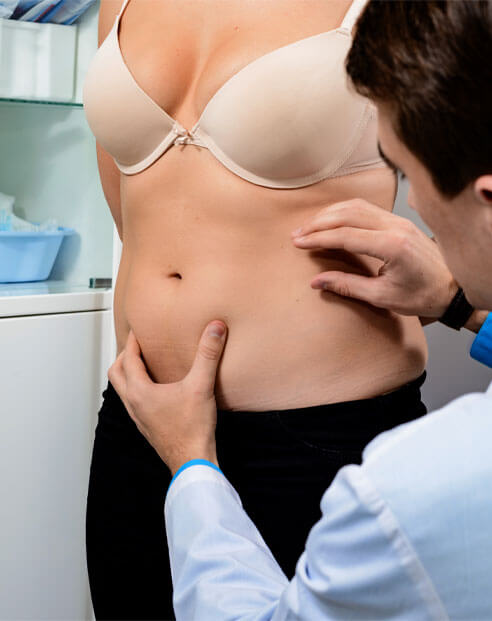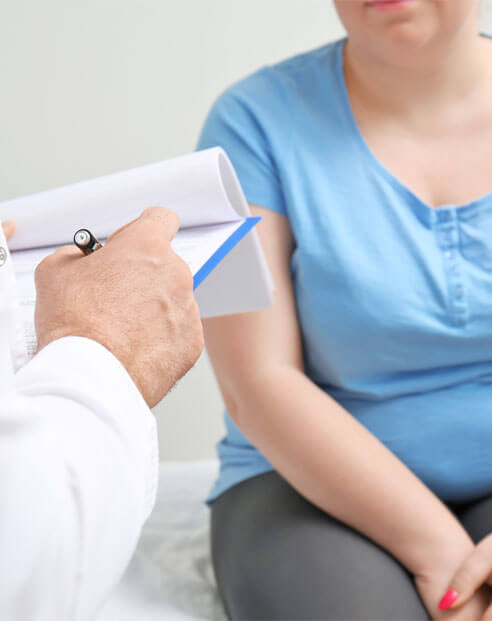Gastric sleeve in Turkey
Gastric sleeve, also called, sleeve gastrectomy is a surgical method of treating obesity by reducing the capacity of the stomach. It is performed laparoscopically. Like other operations in the field of bariatric surgery, it is intended for patients with morbid obesity.
What is gastric sleeve?
Sleeve gastrectomy is currently one of the most frequently performed bariatric surgeries for the treatment of morbid obesity. It consists of a partial excision of the stomach.
The removed part of the organ is located along the greater curvature (part of the stomach). A narrow reservoir is formed from the rest of the stomach, which reduces the capacity of the stomach by 70-80%. Its shape resembles a sleeve and this is where the name of the treatment comes from. From the reservoir, food is transported to the duodenum in a natural way.
With the significant reduction in stomach capacity, the amount of food consumed is limited, resulting in weight loss. Usually, patients after sleeve gastrectomy can only consume about 200 ml of food at a time. Already after a small meal, a full stomach sends a satiety signal.
Online consultation
Online Consultation and Quote
Leave your contact information (name, email address and phone number) to receive a call from our consultants who will answer your questions and deliver a free estimate with personalized cosmetic surgery rates.
Call Us Now at +33 (0)1 84 800 400 or on Whatsapp: +216 24 737 737
Gastric Sleeve
What is the price of Gastric Sleeve in Turkey?
The price of a gastric sleeve offered by Medespoir in Turkey is a competitive price and cheaper than in Europe. Medespoir offers you the opportunity to benefit from an all-inclusive price of your sleeve in Turkey. This price includes all costs related to the procedure; price of the operation, doctors' fees, operating room reservation, post-operative care costs and price of a stay in a luxurious 5 star hotel during the recovery period.
Just request a free quote online to get a cheap, personalized and confidential gastric sleeve price.

Get a free quote or make an appointment.
Patient guideWhat are the indications for sleeve surgery?
Patients qualified for surgical treatment of obesity must meet the following criteria:
- Obesity 3rd degree, i.e., one with a BMI greater than 40,
- Obesity 2nd degree (BMI greater than 35) with concomitant diseases such as hypertension, diabetes, severe osteoarthritis, obstructive sleep apnea syndrome, or coronary artery disease, as well as hepatic steatosis, lipid metabolism disorders, and infertility associated with polycystic ovary syndrome,
- Obesity 1st degree (BMI 30 to 35) in diabetic patients not controlled by medication.
In addition, surgery is indicated for people in whom other treatment methods (for example, treating obesity with an adjustable gastric band) have not produced the expected results. For some patients, sleeve gastrectomy is part of obesity treatment. The next steps are, for example, duodenal bypass or gastrointestinal bypass.
What are the contraindications to the procedure?
There are few absolute contraindications for surgical treatment of obesity. However, the treatment of obesity must first and foremost be safe, so the surgeon will not undertake surgery in every case. The most important contraindications include:
- Incurable neoplasms causing cachexia
- AIDS
- Lack of cooperation from the patient
- Potentially fatal short-term conditions (heart failure, post heart attack, severe respiratory failure)
- Severe coagulation disorders
Sleeve in Turkey
What to do before sleeve surgery in Turkey?
Before undergoing gastric resection, the patient undergoes a qualification process. During this time, he or she must complete the following tests:
- complete blood workup
- cardiac ultrasound,
- abdominal ultrasound
- gastroscopy
In addition, specialist consultations are often required, particularly from a surgeon, anesthesiologist, dietician, psychologist, endocrinologist, cardiologist, and pulmonologist.
Stomach reduction
How does stomach reduction surgery work?
The stomach reduction surgery is performed under general anesthesia and lasts 45 to 90 minutes. During the endoscopic sleeve, 5 incisions about 1 to 2 cm wide are usually made in the skin. Tools, a camera and a light source are introduced into the patient's body.
Using special staplers with titanium staples, the side wall of the stomach is cut and closed at the same time. The excised section of the stomach is removed from the patient's body. In addition, a new gastric leak test is performed during the procedure.
Immediately after surgery, the patient wakes up from anesthesia. Then, at the observation site, the patient receives pain medication and rests under the constant supervision of a team of nurses and physicians. After sleeve gastrectomy, the patient typically stays in the hospital for 2 days.

Schedule Consultation and receive your Free Quote
Patient guideDiet
What diet after gastrectomy?
In many cases, gastric resection requires patients to significantly alter their eating habits (it is often poor nutrition that leads to advanced obesity). Usually, for the first 30 days, a liquid and blended food diet is recommended. After this time, solid foods are gradually introduced. In addition, after the procedure, it is recommended to follow dietary recommendations, such as:
- Eating small meals in volume,
- Carefully chew the food,
- Eat slowly,
- Separate feeding and water intake,
- Eat 5 meals a day.
It is also recommended that dietary supplements be taken to supplement micro and macro elements. Patients after this type of surgery are at risk of developing nutritional deficiencies. In addition, patients should closely monitor the body's reactions to various types of foods and avoid products that are not well tolerated.
Gastric Sleeve
What are the complications of gastric sleeve in Turkey?
As with any procedure or surgery, gastric sleeve is associated with some risk of complications. The most common complications after surgery are:
- Bleeding where the stomach has been cut
- Leaks at the site where a section of the stomach was cut,
- Post-operative wound infections
- Hernia at the postoperative scar site,
- Deep vein thrombosis.

